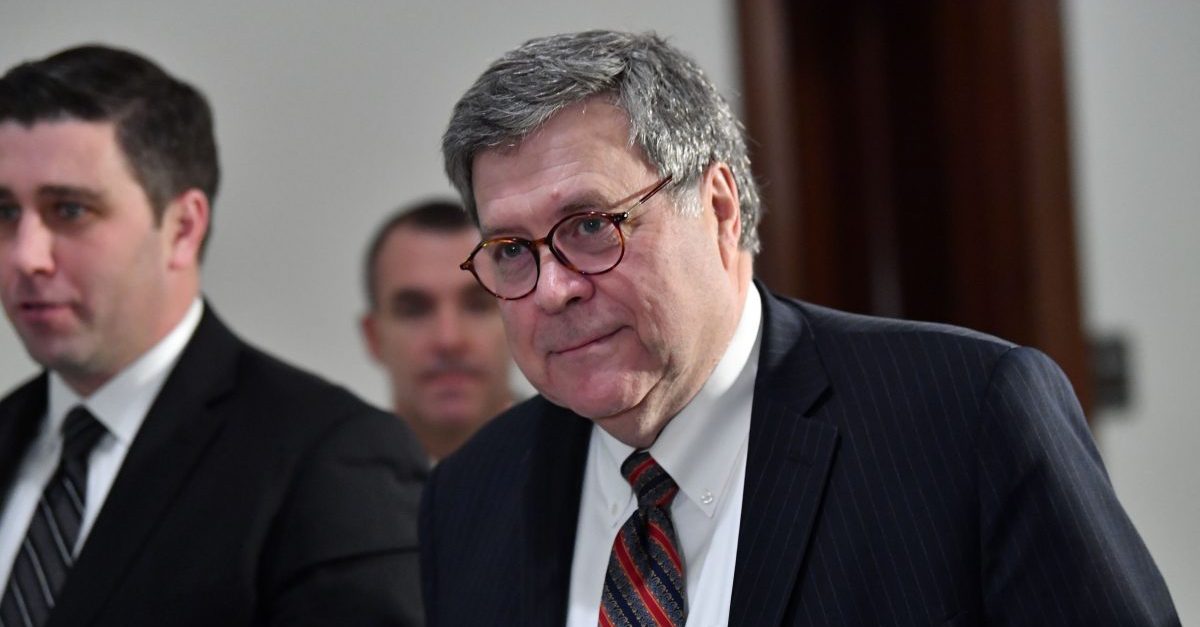
When William Barr was first nominated for the position of U.S. Attorney General, he was immediately hit with criticism and concern from Democrats, who believed that he would simply enable President Donald Trump in nefarious efforts related to Special Counsel Robert Mueller‘s investigation. Those concerns didn’t go away after Barr’s hearing before the Senate Judiciary Committee, especially given speculation that he was being vague in his responses to certain questions. On Monday, however, Barr’s written responses to questions from Committee members were released. Barr made some pretty clear and significant statements to senators that should allay the fears of his critics.
These are the seven that stood out.
1. He’s not going to fire Mueller without good cause, even if Trump tells him to.
Sen. Cory Booker (D-N.J.) didn’t waste any time getting to the point. Booker pointed out that Barr had previously said that if a president gives an order, the Attorney General is required to follow it, or resign if he or she cannot do this. With this in mind, Booker asked if Barr would fire Mueller without good cause, if President Trump ordered it, or if he would resign instead.
Barr was very clear in his response, stating, “I would resign rather than follow an order to terminate the Special Counsel without good cause.”
2. He won’t let Trump do it himself, either.
The current special counsel regulations say that only the Attorney General (or acting AG) can dismiss a special counsel, which is why Trump would need Barr to do it for him. There has been concern over whether Trump would pressure the Justice Department to change the regulations so that he himself could do it. Barr said this won’t happen on his watch.
In response to questions from Booker about this, Barr said:
I do not believe that the Special Counsel regulations should be amended during the current Special Counsel’s work and would resign rather
than alter the regulations for the purpose of firing the Special Counsel without good cause. As I testified, I believe that Robert Mueller should be allowed to finish his investigation. Any review of the existing regulations should occur following the conclusion of the Special Counsel’s work.
3. And by “good cause,” he means good cause.
Sen. Mazie Hirono (D-Hawaii) asked Barr, “Would the President’s displeasure with a lawful action by Special Counsel Mueller taken in accordance with Justice Department regulations constitute good cause?”
“No,” Barr said.
4. He’s going to consult with Mueller on his report.
There has been a lot of confusion regarding what report—if any—will be seen by the public following the conclusion of Mueller’s investigation. Barr received many questions about whether or not he will release Mueller’s report. Barr repeatedly said that Mueller’s report—which goes to the Attorney General—is treated as a confidential document by the special counsel regulations; the AG is then to issue a report to Congress about Mueller’s findings. Barr made several statements regarding his own potential report.
First off, he said in response to questions from Sen. Chris Coons (D-Delaware) and others, that he would consult with Mueller himself for this.
“I intend to consult with Special Counsel Mueller and Deputy Attorney General Rosenstein regarding any report that is being prepared and any disclosures or notifications that I make under applicable regulations as Attorney General,” he said.
5. He will be thorough and “transparent.”
One word that Barr used over and over in his responses was “transparency.” He stressed to several Senators that he believes the public and Congress need to know about the results of Mueller’s investigation.
“I believe that it is very important that the public and Congress be informed of the results of the Special Counsel’s work,” he said multiple times. “My goal will be to provide as much transparency as I can consistent with these regulations, applicable law, and the Department’s longstanding practices and policies.”
6. Barr acknowledged that Congress can release Russia probe report, even if he doesn’t want them to.
Worrying about the possibility of Barr not wanting his report to be released to the public, Sen. Amy Klobuchar (D-Minn.) pressed Barr on whether or not he believes that Congress could go over his head. His response? A resounding yes.
“Although there could conceivably be information in the Attorney General’s report, such as classified information, that may not be publicly disclosed,” Barr said, “28 C.F.R. § 600.9(a)(3) does not itself restrict what Congress may do with the report.”
7. Trump did not ask for loyalty.
Former FBI Director James Comey claimed in his infamous memos that President Trump once asked him for loyalty. Barr stated that the president made no such request of him. In response to Sen. Hirono, Barr said:
The President has never sought any assurances, promises, or commitments from me of any kind, either express or implied, and I have not given him any, other than that I would run the Department of Justice with professionalism and integrity. The President has never asked for my “loyalty,” nor has he made any “threats” to me.
The Senate is reportedly expected to vote on Barr’s confirmation on February 11.
A Senate vote on the nomination of William Barr to be Attorney General is expected the week of February 11, GOP Sen John Cornyn tells @NOgnanovich
— Laura Litvan (@LauraLitvan) January 28, 2019
[Image via NICHOLAS KAMM/AFP/Getty Images]